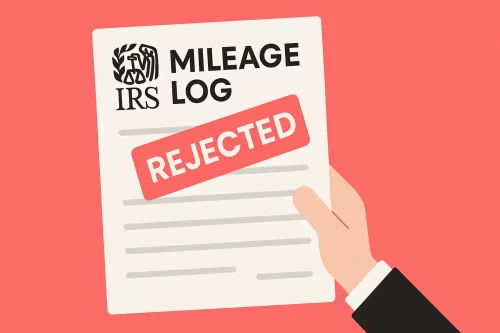Home » Mileage Log for IRS Audit 2024 » What to Do if the IRS Did Not Accept Your Mileage Log
Last Updated: June 27, 2025
Did the IRS reject your mileage log? Don’t panic! Many people face this challenge, but understanding the reasons behind the rejection and knowing the appropriate steps to take can turn things around. An accurate mileage log is crucial for claiming vehicle deductions, saving you significant money on your taxes. Let’s dig into the possible reasons why the IRS did not accept your mileage log and how you can get back on track.
Table of Contents
Why Your Mileage Log Might Have Been Rejected by the IRS
The IRS demands detailed, accurate, and timely records for all claimed business expenses, including vehicle mileage. When your mileage log doesn’t meet these strict requirements, it raises red flags and often leads to denied deductions and potential penalties. The primary reasons the IRS rejects mileage logs boil down to a lack of detail, accuracy, or contemporaneous record-keeping.
Inaccurate or Missing Information
This is a big one. If your log lacks key details for even a single trip, the IRS might deem the entire log unreliable. This includes missing dates, incorrect mileage, or vague business purposes. For example, simply writing “client meeting” without the client’s location or the specific business conducted might raise suspicion.
Logs Not Kept Contemporaneously
The IRS wants you to record your mileage as it happens, or soon after. If you try to create a log months after the fact by estimating or just guessing, it won’t hold up. They look for consistency and immediate entry.
Mathematical Errors
Simple mistakes in calculations, such as adding up your daily miles incorrectly or inconsistencies between your trip logs and your year-end odometer readings, can trigger a rejection.
Inadequate Record Keeping
This goes beyond just the mileage log itself. If you don’t have supporting documents like receipts, appointment calendars, or emails to back up your trips, the IRS may question the legitimacy of your mileage. They want to see that your log aligns with other aspects of your business.
Lack of Separation Between Personal and Business Use
Some self-employed individuals fail to clearly distinguish between personal errands and legitimate business trips. The IRS expects a clear separation, and logging personal trips as business trips is a surefire way to get your log rejected.
IRS Recordkeeping Requirements: Your Blueprint for Success
To ensure your mileage log is audit-proof, you must understand and adhere to the IRS’s specific requirements. Think of these as the ingredients for a perfectly compliant log.
What Information the IRS Requires
For each trip you claim for business, medical, or charitable purposes, your mileage log for your audit must include:
- Date: The exact date of the trip.
- Miles: The specific number of miles driven for that trip.
- Purpose: A clear, concise, and detailed explanation of the business reason for the trip. “Client meeting” isn’t ideal; “Meeting with John Smith at Acme Corp. to discuss Q3 sales forecast” doesn’t raise any questions during an IRS mileage audit.
- Starting and Ending Locations: The precise addresses or specific points of origin and destination. This helps the IRS verify the distance and purpose.
- Year-Starting and Year-Ending Odometer Readings: These are critical to show the total miles your vehicle traveled during the tax year and to calculate the percentage of business use (in case you deduct actual vehicle expenses instead of the mileage rate).
The Importance of Contemporaneous Records
The IRS stresses that you should create your mileage log at the time of the travel or as soon after as possible. This ensures accuracy and credibility. Reconstructing a log months later using estimates is a major red flag for auditors. An active voice is crucial here: You must keep your records consistently.
Acceptable Formats for Your Mileage Log
The good news is the IRS doesn’t dictate a single format. You can use:
- Handwritten Logs: A notebook kept in your car. Make sure your handwriting is legible and all information is complete.
- Spreadsheets: Digital documents like Excel or Google Sheets.
- Mileage Log Apps: Digital solutions like MileageWise automatically track your trips and generate IRS-compliant logs. These are quickly becoming the gold standard for ease and accuracy.
Steps to Take If the IRS Did Not Accept Your Mileage Log
If you’ve received a notice that the IRS did not accept your mileage log, don’t despair. You have options. The key is to respond promptly and methodically.
Review the IRS Notice Carefully
First, understand exactly why your mileage log was rejected. The notice should specify the deficiencies. Was it missing information? Were there mathematical errors? Did they question the business purpose of certain trips? Knowing the specific issues helps you target your response.
Examine Your Existing Log for Errors
Go through your submitted log line by line. Compare it to the IRS requirements. Identify where the missing information, inaccuracies, or inconsistencies lie. Be honest with yourself about any shortcomings.
Correct and Resubmit with Clear Records
Once you identify the errors, gather all supporting documentation possible:
- Receipts: Gas receipts, parking stubs, toll receipts.
- Appointment Books/Calendars: Digital or physical calendars showing meeting details.
- GPS Data: If you use a device or app that tracks your location.
- Emails/Texts: Communications related to meetings or business activities.
- Service Records: Showing odometer readings during maintenance.
Use these to reconstruct or correct your log as accurately as possible. The more evidence you have, the stronger your case.
Seek Professional Guidance
If you’re unsure how to proceed, especially if large deductions are at stake, consult a qualified tax professional or a mileage tracking expert. They can help you understand the IRS’s demands and best represent your case.
Respond Within Deadlines
The IRS notice will specify a deadline for your response. Do not miss it. Timely communication shows good faith and protects your rights.
Here’s a helpful video guide for more tips.
Fix Your Mileage Log Issues with MileageWise
The best defense against a rejected mileage log is a strong offense: using a retroactive mileage log software. This is where MileageWise shines. We understand the precise needs of professionals stuck in this situation.
MileageWise is a comprehensive solution designed to make mileage logging effortless and audit-proof.
AI Wizard Mileage Log Generator
This exclusive tool is a game-changer. If you have gaps in your historical data or need to reconstruct past trips, the AI Wizard steps in. It intelligently suggests missing trips, helps you complete your log, and adheres to your needs and preferences. All while staying fully IRS-compliant. No more guesswork and endless calculations!
Google Maps Timeline Integration
Unique to MileageWise, this feature allows you to import your Google Location History. This is incredibly powerful for confirming past routes and locations, ensuring your log aligns perfectly with your actual movements. You can then easily manage and refine these trips within MileageWise.
Mileage Log Preparation Service
This personalized service takes the hassle out of audits and record-keeping. Our experts step in to analyze your data, reconstruct missing trips, and prepare a detailed, IRS-proof mileage log on your behalf. We gather supporting evidence, ensure accuracy, and help you avoid costly penalties. Peace of mind and professional backup, when you need it most.
Try MileageWise for free for 14 days. No credit card required!
My Journey from Panic to Peace: A User’s Story
I’m a DoorDash deliverer and last year, the IRS sent me a notice about my mileage deduction: they expected me to hand in a mileage log. My stomach dropped! I’d kept a messy handwritten log in a notebook and rogue pieces of paper. I thought I pieced it well together, but the next letter said the IRS did not accept my mileage log because my miles and odometer readings didn’t add up. I panicked, picturing thousands in back taxes and penalties.
Then a friend told me about MileageWise. I was short on time, so I decided to go with their Preparation Service, and it was a lifesaver. Their team analyzed my records, reconstructed my trips, and created a fully IRS-compliant log, even using my Google Maps data. The IRS accepted their version, and I was so relieved it was finally over. I later discovered their app and decided to use it to track my miles to never get into this situation again. Thank you so much for the help!
Conclusion: Your Path to Audit-Proof Mileage
If your mileage log was rejected by the IRS, it’s a critical wake-up call. Don’t let denied deductions or potential penalties undermine your financial stability. Take proactive steps to ensure your mileage records are impeccable.
Here’s your action plan:
- Understand the Rejection: Identify the specific reasons the IRS gave for denying your mileage log.
- Gather Evidence: Collect all supporting documents for your trips.
- Correct Your Log: Update your log with precise and complete information.
- Consider Professional Help: Consult a tax expert or MileageWIse’s Preparation Service if you’re unsure.
- Avoid Future Trouble: Make consistent, contemporaneous record-keeping a habit.
By following these steps and leveraging powerful tools like MileageWise, you can confidently claim your rightful deductions, secure your finances, and never have to worry about a rejected mileage log again.
FAQ
Is a handwritten mileage log acceptable to the IRS?
Yes, handwritten logs can be accepted if they are complete, accurate, legible, and recorded contemporaneously. However, they are more susceptible to scrutiny than digital logs, and discrepancies or corrections may raise red flags.
Why did the IRS not accept my mileage log?
The IRS may reject mileage logs if they rely on estimates rather than actual records, lack required details (such as date, business purpose, starting/ending point, and miles driven), are inconsistent, or appear to have been created after the fact. Logs must be accurate, complete, and corroborated by supporting evidence (e.g., receipts, calendars).
Can I use estimates when reconstructing a mileage log?
No, the IRS specifically requires actual, detailed records over estimates. If you’re audited and only have estimates, the mileage deduction may be denied unless you provide corroborating evidence (receipts, calendar entries). However, if your records are lost due to circumstances beyond your control, you may reconstruct them using secondary evidence.
If I lost my mileage log, what secondary evidence can I provide?
You can provide credit card receipts, fuel/maintenance records, toll receipts, calendar entries, client communications, and appointment records. These can help reconstruct your mileage if the original log is unavailable for reasons beyond your control (theft, software failure, etc.).
How far back can the IRS audit my mileage logs?
Generally, the IRS has three years from the date you file your return to audit it, but this can extend to six years or longer in cases of substantial understatement of income or fraud. You should keep your mileage logs and supporting evidence for at least three years.
What happens if my mileage deduction is disallowed by the IRS?
If the mileage deduction is disallowed, you may have to pay back taxes, interest, and possibly penalties. You can appeal the decision by providing better documentation or supporting evidence, like repair records showing odometer readings or appointment calendars.




